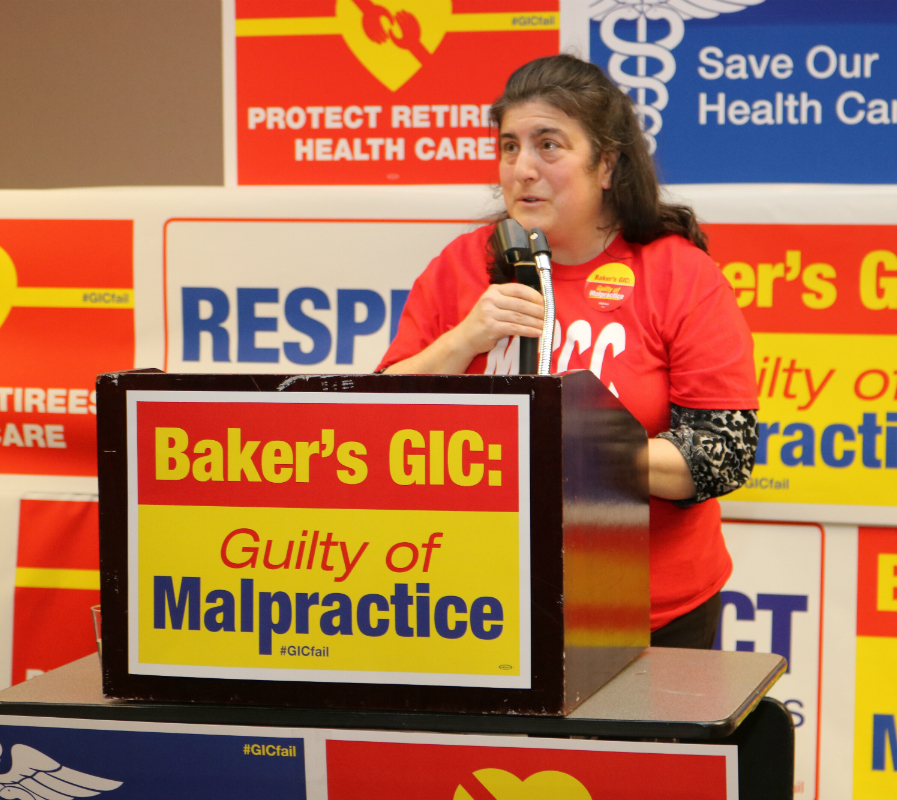Union power forces GIC to reverse course on health care carriers
Union power forces GIC to reverse course on health care carriers

Intense pressure applied by members of the MTA and other public-sector unions has forced the Group Insurance Commission to reverse its recent decision to eliminate most of the insurance carriers currently available to active and retired employees.
The GIC voted today to retain three carriers that it had voted to eliminate for active employees: Harvard Pilgrim Health Care, Fallon Health and Tufts Health Plan.
“This is what union power is all about,” said MTA President Barbara Madeloni. “We still have work to do to make the GIC’s process more democratic and transparent. And we still must prevent harmful cost-shifting to members as the GIC works on plan designs and rates. But because so many members attended hearings and our rally or made calls to elected officials, we were able to undo a terrible decision that would have compromised the health care of hundreds of thousands of people.”

Some retirees will still need to shift carriers under the GIC’s revised scenario if their existing carrier did not bid to cover the particular insurance pool to which they belong or failed to meet the parameters of the bid.
On Jan. 18, the GIC, which includes several members appointed by Governor Charlie Baker, voted 8-5 to eliminate more than half of the insurance carriers used by the 440,000 active and retired public employees who receive health care benefits through the commission and to shift the bulk of the business to Indiana-based UniCare. The five labor representatives on the commission all voted against the plan.
They voiced anger over the fact that they had received packets of information only hours before the vote and did not have sufficient time to study the impact of such a drastic change.
Public-sector unions immediately assailed the decision. Both active and retired employees flooded Baker’s office and the GIC with phone calls and e-mails calling out the attack on working families.
The GIC attempted to explain the decimation of benefit options at a series of public hearings, but outrage grew as participating members learned that those hearings were often being held when most people were working — and that the hearings were taking place at venues that quickly filled to capacity, leaving hundreds locked out.
The MTA and other public-sector unions held an emergency rally on Tuesday at the Boston Teachers Union Hall, where hundreds of members demanded action. More than a dozen elected officials attended the coalition event, and the message to them was clear: The process by which public employee health care benefits are set is deeply flawed and must be changed.
“The GIC’s decision can affect people in a number of ways, none of them positive.”
Bonnie Player, Framingham Teachers Association
MTA members shared their health care stories at the rally, describing the negative impact they would face if forced to change insurance carriers — or, worse, lose their doctors and access to the places where they now receive care.
“The GIC’s decision can affect people in a number of ways, none of them positive,” said Bonnie Player, a member of the Framingham Teachers Association who is undergoing cancer treatments.
Andrew Baker, president of the Lexington Education Association, described the plight of his best friend, a fellow educator whose daughter requires intensive ongoing care.
“The history of the GIC is one of broken promises,” Baker said, noting that his friend is considering a move from Lexington to a school district that does not use the GIC to provide insurance to its educators. “If this downward trend continues, municipalities will be the losers in the end.”
If there weren’t enough reasons for @MassGIC to reverse its 1/18 vote, we’re giving them many more. These MTA members are holding cards with personal stories about how they’ll be affected by the decision to cut health care providers. #GICfail pic.twitter.com/gna7DITQ8D
— Mass Teachers Assn (@massteacher) January 30, 2018
Julia Monteiro Johnson, a member of the MTA Retired Members Committee, said that retirees simply no longer trust the GIC.
“We are fighting mad, and we are fighting back,” she said.
Madeloni framed the boundaries of that fight through the actions that took place before the GIC reversed course. In her remarks at the rally and in testimony at a Senate oversight hearing held on Wednesday, she criticized the lack of labor representation on the GIC and the agency’s existing process of holding separate votes to determine carriers, plans and rates.
“This is absolutely outrageous,” she said. “Why do we have to fight for quality health care that we can afford?”
The MTA supports passage of a bill that would increase the number of labor seats on the GIC to balance the say of gubernatorial appointees.
Timothy Sullivan, the MTA’s representative on the commission, forcefully made the point at today’s meeting that the commission must change its process to allow for greater public input and a sensible decision-making process.
Upcoming decisions by the GIC to set plan designs and rates are of immediate concern. The commission will take up those issues at a meeting that is yet to be scheduled and at its next regularly scheduled meeting on Feb. 22.
“This is no time to let up the pressure,” Madeloni said.